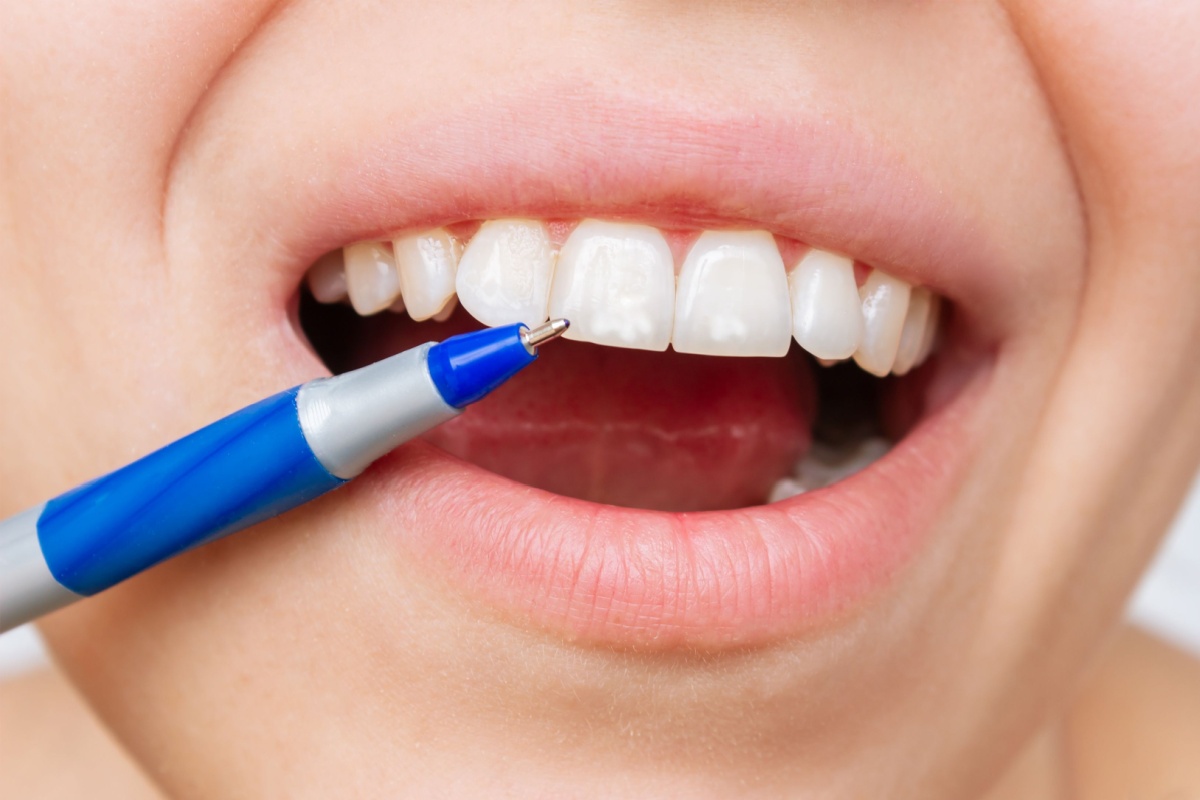Noticing white spots on your teeth can be concerning, especially if you don’t know the cause. These spots can appear for various reasons, some related to lifestyle choices and others due to childhood factors. Understanding what causes these white spots and knowing your options for removing or minimizing them can help you keep your smile bright and healthy. We’re here to explore common causes of white spots on teeth, prevention tips, and professional treatment options to restore your smile’s natural look. Let’s take a look!
Common Causes of White Spots on Teeth
Dental Fluorosis
While fluoride is beneficial for dental health, too much fluoride can interfere with the normal development of a person’s teeth enamel, especially in children. Excessive exposure to fluoride, often through fluoridated drinking water or swallowing toothpaste, can lead to a condition called fluorosis. Dental fluorosis causes white or even brown spots on premature baby teeth as well as adult teeth, making them appear patchy.
Weak Tooth Enamel
Enamel hypoplasia is a condition where the enamel doesn’t form properly, resulting in a thinner layer of protection. This condition occurs for several reasons — perhaps a person was born prematurely, didn’t consume essential minerals or nutrients, or faced certain childhood illnesses. Without a strong layer of enamel, a person’s teeth are more susceptible to decay, which can lead to white spots on the teeth and other consequences. If you or your child experience enamel hypoplasia, speak to your dentist to assess the extent and recommend steps to prevent white spots from worsening in the future.
Poor Oral Hygiene (Especially with Braces)
Practicing good oral hygiene is crucial, particularly for those with braces. Plaque accumulation around the brackets can lead to white spots after braces are removed. This buildup contains harmful bacteria that can weaken enamel and cause tooth decay. Children’s teeth are also particularly vulnerable to plaque since they can exhibit poor dental hygiene if they haven’t yet learned how to take care of their teeth. Good dental hygiene, including regular brushing and flossing, can prevent these spots from forming.
Acidic and Sugary Foods
Consuming too many sugary and acidic foods or drinks can wear down the tooth enamel, leaving your teeth vulnerable to white spots. Acidic foods like citrus fruits, combined with sugary treats, can erode enamel and allow bacteria to grow. Over time, these bacteria cause mineral loss in the enamel, leading to white spots on the teeth. Reducing sugary foods and choosing water over sugary beverages can help prevent white spots.
Preventing White Spots on Teeth
Preventing white spots requires a combination of good oral hygiene and diet adjustments. Regular brushing, flossing, and visiting the dentist for checkups are essential practices that promote dental health. Here are some steps you can take to reduce your risk:
Focus on Oral Hygiene
Brushing twice daily with a fluoride-containing toothpaste, flossing, and using mouthwash can prevent plaque buildup and reduce bacteria on your teeth. If you have a condition like enamel hypoplasia, communicate with your dentist about strategies to manage it.
Reduce Sugary and Acidic Foods and Drinks
Foods like candy and soda can damage enamel, leading to white spots on the teeth or even tooth decay. Reducing sugary and acidic foods and drinks and rinsing with water after meals can help protect your teeth.
Monitor Fluoride Intake
Especially for children, it’s important to use fluoride toothpaste in moderation and avoid swallowing it. You should also consult your dentist to determine if fluoridated water may be causing excess fluoride exposure. If this is the case, they may recommend using a filter for fluoride-free water and taking fluoride supplements instead.
Take Extra Care with Braces
For those wearing braces, following a careful cleaning routine can prevent white spots. Be sure to brush around brackets and wires to prevent plaque accumulation.
Treatment Options for White Spots on Teeth
If you already have white spots on your teeth, several treatment options can reduce their appearance. The right solution depends on the underlying cause, so it’s essential to consult with your dentist before beginning any treatment. Here are some common methods for addressing white spots:
Professional Teeth Whitening
Teeth whitening is a popular treatment that can lighten the color of the entire tooth, helping the white spots on your teeth blend with the surrounding enamel. Teeth whitening provided by dentists is more effective than over-the-counter teeth whitening toothpaste, strips, or other products and is customized to your dental needs. Although teeth whitening may not completely remove the white spots, it can improve the overall appearance of tooth discoloration.
Enamel Microabrasion
Enamel microabrasion involves removing a thin layer of a person’s teeth enamel to reduce the appearance of white spots on the teeth. This technique is especially effective for superficial spots and may be combined with other treatments like teeth bleaching. Your dentist will determine if microabrasion is the best option based on the size and depth of your white spots.
Dental Veneers or Tooth-Colored Composite Restorations
In cases where white spots are more severe, dental veneers may be recommended. Veneers are thin shells placed over the surface of the teeth to mask discoloration and give a uniform appearance. Alternatively, a matching composite can be applied to blend the white spots with the natural tooth color. This treatment is particularly effective if the spots are extensive and other options haven’t achieved the desired results.
Enjoy a Bright & Beautiful Smile!
White spots on teeth can be caused by various factors, from enamel hypoplasia and wearing braces to too much fluoride during childhood. While a few white spots may not be a cause for concern, they can sometimes indicate poor dental hygiene or a deeper issue with your health, so it’s essential to address them promptly with a dental professional before you run the risk of tooth decay.
At Hamilton Dental Associates, we’re here to help identify the underlying cause of your white spots and create a customized treatment plan to restore your confident smile. Whether you need teeth whitening, veneers, or another solution, our cosmetic dentistry team will work with you to find the best solution for your teeth and overall oral health. Contact our office today to schedule your appointment and say goodbye to those frustrating white spots!







